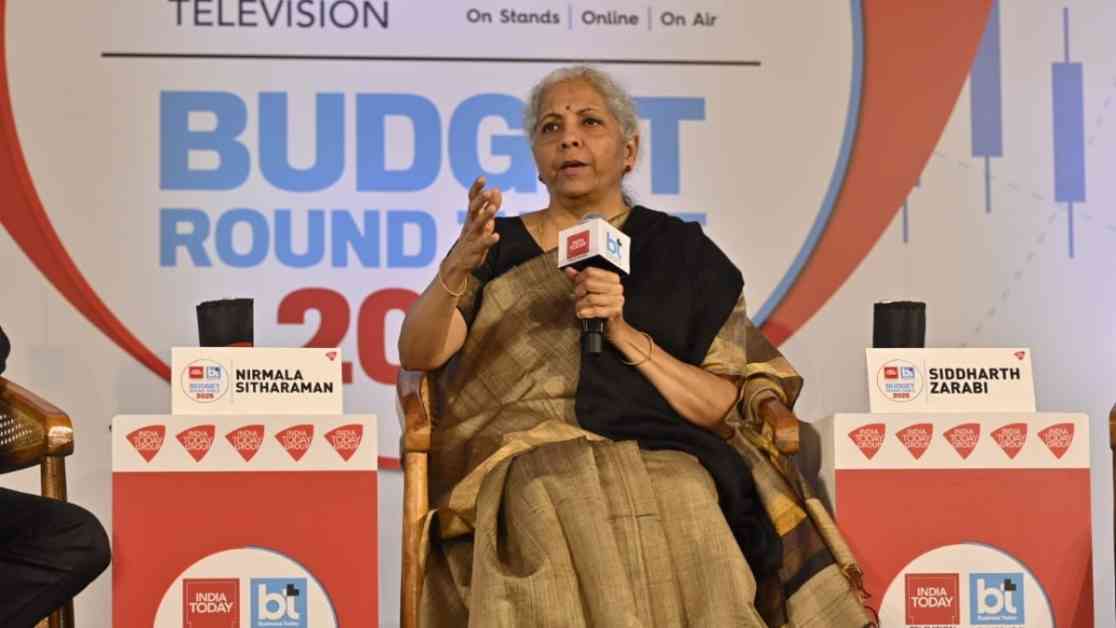Finance Minister Nirmala Sitharaman recently emphasized the resilience of India’s economic foundation during the India IT-BT Budget Round Table 2025. The minister highlighted that despite recent concerns over urban demand slowing down, the Indian economy remains robust with a stable currency and ruled out any structural downturn. Her remarks come on the heels of the Union Budget 2025-26 announcement, featuring significant income tax relief measures aimed at bolstering taxpayer trust and stimulating savings and consumption.
Government’s Commitment to Taxpayers
During the India Today-Business Today Budget Round Table 2025, Sitharaman reiterated the government’s unwavering dedication to respecting taxpayers. She elaborated on initiatives like faceless assessment and the taxpayers’ charter introduced in previous budgets. The finance minister emphasized that the recent income tax rebates proposed in the latest budget are part of Prime Minister Modi’s ongoing efforts to instill confidence and trust among taxpayers.
Sitharaman further highlighted that the tax relief measures are expected to positively impact savings and consumption patterns in the economy. By increasing disposable income through revised income tax slabs and exemptions, the government aims to stimulate consumer spending, particularly in fast-moving consumer goods and discretionary sectors. Additionally, the minister anticipates a boost in bank deposits and investments, signaling a potential uptick in economic activity.
The Union Budget 2025-26 outlines a comprehensive overhaul of income tax structures, including the introduction of zero tax on annual income up to Rs 12 lakh. Sitharaman’s proposed new Income Tax Act, slated for parliamentary introduction, prioritizes simplicity and compliance to streamline the tax system. While the timeline for passing the Act remains uncertain, the finance minister expressed willingness to engage with the Parliamentary Standing Committee on Finance for further deliberations.
Global Economic Landscape and Tariff Concerns
Amidst a dynamic global economic landscape, Sitharaman addressed concerns regarding tariff actions by the US and their potential impact on India. While refraining from speculative predictions, the finance minister highlighted the need to monitor developments closely. She emphasized the importance of assessing the fallout from tariff hikes targeting countries like China, Mexico, and Canada, while also acknowledging the broader implications for India.
Despite recent fluctuations in currency values, particularly against the US dollar, Sitharaman underscored India’s strong market fundamentals. Citing India’s consistent economic growth rates and stable currency performance, the minister dismissed notions of a systemic slowdown. With projected growth rates of 6.4% in the current fiscal year and 6.3% to 6.8% in FY26, India’s economic outlook remains positive amidst global uncertainties.
In response to concerns about foreign portfolio investors pulling out of Indian markets, Sitharaman emphasized the need to enhance India’s attractiveness as an investment destination. The finance minister highlighted ongoing efforts to review the Bilateral Investment Treaty model to encourage foreign investments and promote economic growth. Despite domestic challenges, Sitharaman remains focused on positioning India as a resilient and appealing market for global investors.
As India navigates evolving global economic dynamics and policy shifts, Sitharaman’s proactive approach to fiscal management and economic stability underscores the government’s commitment to fostering sustainable growth and investor confidence. By prioritizing taxpayer trust, simplifying tax regulations, and adapting to changing global trends, India’s economic resilience remains a cornerstone of its growth trajectory.























